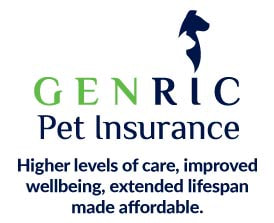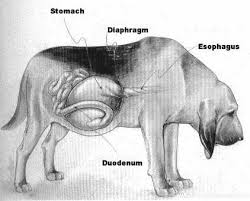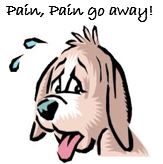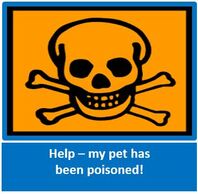|
Both Gastric Bloat and Gastric Dilation-Volvulus (GDV)also known as Gastric Torsion, are very serious conditions, and you need to get to your vet immediately - time really is of the essence in this situation.
Also do ensure that you are covered financially if this, or any other medical situation arises. We offer No Annual Limit - No Sub-limits - Lowest Excess - Vet of your choice, and so much more. Do visit our website to see the benefits and plans we have available. Should you have any questions, we will be delighted to hear from you. www.genricpet.co.za |
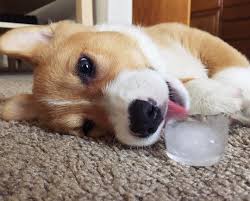
Do Ice Cubes Cause Bloat in Dogs?
Don’t Believe Everything You Read.
www.petful.com
(Great website with lots of interesting articles really worth a visit - enjoy!)
Don’t Believe Everything You Read.
www.petful.com
(Great website with lots of interesting articles really worth a visit - enjoy!)
An old myth has resurfaced, and everyone’s worried. Here are the straight facts about gastric bloat or GDV.
Recently, a friend sent me an old post on Facebook that keeps resurfacing and just won’t go away. It warns about the supposed dangers of ice cubes causing gastric bloat in dogs.
Now, veterinarians all over the country are once again getting frightened calls from pet families.
Summer is a time when folks might offer their overheated dogs some ice cubes. (No mojitos for Rusty, please — just the cubes!) Let me set the record straight again about the disturbing and still mysterious syndrome called bloat.
Many of you who have had a dog affected by bloat or GDV (gastric dilatation-volvulus), may have surfed the web and been confused by conflicting information. The ice cube myth has been debunked already. But many things about bloat, including what “causes” this life-threatening condition, are still a mystery and give rise to wrong or misleading information.
Do Ice Cubes Cause Bloat in Dogs? Don’t Believe Everything You Read.An old myth has resurfaced, and everyone’s worried. Here are the straight facts about gastric bloat or GDV.
Dr. Debora Lichtenberg, VMD
Bloat in dogs can be serious, but ice cubes aren’t a likely culprit.Recently, a friend sent me an old post on Facebook that keeps resurfacing and just won’t go away. It warns about the supposed dangers of ice cubes causing gastric bloat in dogs.
Now, veterinarians all over the country are once again getting frightened calls from pet families.
Summer is a time when folks might offer their overheated dogs some ice cubes. (No mojitos for Rusty, please — just the cubes!) Let me set the record straight again about the disturbing and still mysterious syndrome called bloat.
Many of you who have had a dog affected by bloat or GDV (gastric dilatation-volvulus), may have surfed the web and been confused by conflicting information. The ice cube myth has been debunked already. But many things about bloat, including what “causes” this life-threatening condition, are still a mystery and give rise to wrong or misleading information.
Dog caretakers who have suffered through this devastating situation with their own dogs like to theorize about what “caused” their pet to bloat or suffer from GDV. For folks who have breeds at risk as part of their family, although there are precautions you can take to help reduce the risk of your dog bloating, bloat can occur despite all precautions.
In my experience with my canine patients, some risk factors for bloat may be more prevalent during the summer months, depending on your dog’s lifestyle.
What Is Gastric Bloat or GDV?
Now, veterinarians all over the country are once again getting frightened calls from pet families.
Summer is a time when folks might offer their overheated dogs some ice cubes. (No mojitos for Rusty, please — just the cubes!) Let me set the record straight again about the disturbing and still mysterious syndrome called bloat.
Many of you who have had a dog affected by bloat or GDV (gastric dilatation-volvulus), may have surfed the web and been confused by conflicting information. The ice cube myth has been debunked already. But many things about bloat, including what “causes” this life-threatening condition, are still a mystery and give rise to wrong or misleading information.
Do Ice Cubes Cause Bloat in Dogs? Don’t Believe Everything You Read.An old myth has resurfaced, and everyone’s worried. Here are the straight facts about gastric bloat or GDV.
Dr. Debora Lichtenberg, VMD
Bloat in dogs can be serious, but ice cubes aren’t a likely culprit.Recently, a friend sent me an old post on Facebook that keeps resurfacing and just won’t go away. It warns about the supposed dangers of ice cubes causing gastric bloat in dogs.
Now, veterinarians all over the country are once again getting frightened calls from pet families.
Summer is a time when folks might offer their overheated dogs some ice cubes. (No mojitos for Rusty, please — just the cubes!) Let me set the record straight again about the disturbing and still mysterious syndrome called bloat.
Many of you who have had a dog affected by bloat or GDV (gastric dilatation-volvulus), may have surfed the web and been confused by conflicting information. The ice cube myth has been debunked already. But many things about bloat, including what “causes” this life-threatening condition, are still a mystery and give rise to wrong or misleading information.
Dog caretakers who have suffered through this devastating situation with their own dogs like to theorize about what “caused” their pet to bloat or suffer from GDV. For folks who have breeds at risk as part of their family, although there are precautions you can take to help reduce the risk of your dog bloating, bloat can occur despite all precautions.
In my experience with my canine patients, some risk factors for bloat may be more prevalent during the summer months, depending on your dog’s lifestyle.
What Is Gastric Bloat or GDV?
- There is gastric bloat, a condition where the stomach fills up with gas like a balloon, becomes increasingly distended, and the gas cannot escape. This is very serious and requires emergency treatment.
- Then there is gastric dilatation-volvulus (GDV), also known as gastric torsion, where the stomach actually twists on itself, cutting off inflow and outflow from the stomach. GDV is even more serious than gastric bloat.
Both situations are extreme emergencies. If treatment is not instituted within a few hours, the situation can become life-threatening.
Survival rates are correlated with timely treatment. Even with treatment, different studies report that anywhere from 25 to 40 percent of affected dogs will not make it.
What Are the Symptoms?
Classic symptoms of bloat or GDV include:
Survival rates are correlated with timely treatment. Even with treatment, different studies report that anywhere from 25 to 40 percent of affected dogs will not make it.
What Are the Symptoms?
Classic symptoms of bloat or GDV include:
- Mild to extreme gastric distention
- Vomiting
- Restlessness
- Retching
- Excessive burping
- Flatulence
When a dog has classic bloat, pet caretakers call me and say, “His belly looks swollen” or “It looks like he swallowed a basketball.” This is when I tell them to get the dog to me or the nearest veterinary emergency facility immediately.
Dogs will often drool excessively while bloating, may often exhibit restlessness in the early stages of the disease, but then may stand in a fixed position with an obviously bloated abdomen. If you “ping” the stomach, it can feel like a drum.
Pet families may also report there has been recent stress, such as kenneling, transport to or from a dog show, recent surgery, new changes in the household, etc. Bloat emergency calls are over-represented in the evening hours or very early morning hours, when most veterinary hospitals are closed.
What Breeds Are at Risk?
When a vet thinks of bloat, she first thinks Great Dane. This breed is the number 1 breed to bloat, with some studies reporting as many as 40 percent of Danes will bloat some time in their life.
Giant and large breed dogs with deep, narrow chests are predisposed to bloat. Here is a list of breeds prone to bloat — but this list is not exhaustive. Any dog, particularly larger dogs, can bloat:
- Great Dane
- German Shepherd
- Akita
- Bloodhound
- Standard poodle
- Irish and Gordon setter
- Wolfhound
- Weimaraner
- Rottweiler
- Newfoundland
- Collie
- Saint Bernard
|
These breeds were over-represented in one of the largest studies. Other lists include the Doberman. Of smaller breeds, the Bassett hound is predisposed to bloat/GDV.
What Should You Do If You Suspect Bloat? Get to the nearest veterinarian, preferably a clinic or emergency facility that can handle emergency surgery if necessary. This is a situation where time is of the essence. Survival rates increase with quick action. |
Educate Yourself
If one of the breeds prone to bloat is part of your family, make yourself knowledgeable about the disease. Here are 4 factors:
1. Feeding
Feeding 1 large meal a day is a risk factor for breeds prone to bloat, plain and simple. Instead, 3 smaller feedings daily is recommended. Eating rapidly and gulping air is most likely a risk factor. Dry dog food alone may be a risk factor. This is controversial.
Rigorous exercise one hour before or after a meal used to be considered a risk factor. Today, this is also controversial. Elevated food bowls are most likely a risk factor. Feeding from the floor or very low to the ground is the current recommendation. Stress during eating is a risk factor. Competition and other stresses around the food bowl should be avoided.
2. Age and Genetics
The possibility of bloat increases with age, the common age being between 3 and 7 years old. If a close relative of a pup has bloated, this is a risk factor that your pup could bloat as she ages. Try to do some detective work if you are purchasing a breed at risk for bloat. Make sure a parent, aunt or uncle of your pup has never bloated.
3. Personality
Don’t worry. Be happy! Studies have found that “happy” dogs have less of a tendency to bloat. This feeds right into the idea that stress can be a risk for causing bloat. Nervous, anxious, worried dogs may be under more stress, which means they may be more likely to bloat.
4. Stress
Bloat is higher in dogs who have undergone stresses such as being in a kennel, being trucked back and forth to dog shows, having had recent surgery, etc.
Time of year might be a factor, or maybe not:
My worst bloat and GDV cases occurred when I worked at a veterinary hospital with a kennel attached. I specifically remember a bloodhound and a German Shepherd, regular guests at the kennel, who seemed to always be quite contented guests but bloated during one of their frequent kennel stays. The bloodhound was found bloated by the kennel staff at 7 a.m. The shepherd was discovered by me late at night when I went in for another emergency.
Both of these occurred in the summer, when the kennel was the busiest. Most of my other bloats or GDVs were emergency calls that I treated late at night. I only recall 3 or 4 bloats that came in during regular hospital hours.
Prevention
In recent years, many veterinarians have recommended a gastropexy for breeds or individual dogs at high risk. A gastropexy is a tacking of the stomach that can be performed during a spay or neuter as an additional procedure. Although it is possible for bloat to occur after a gastropexy, it is rare. GDV should not occur in a dog with a functional gastropexy.
There is no way to predict when a dog may bloat, but understanding the signs of this potentially fatal condition, knowing your breed’s predilection and absolute quick emergency recognition and response on your part may save your dog’s life.
If one of the breeds prone to bloat is part of your family, make yourself knowledgeable about the disease. Here are 4 factors:
1. Feeding
Feeding 1 large meal a day is a risk factor for breeds prone to bloat, plain and simple. Instead, 3 smaller feedings daily is recommended. Eating rapidly and gulping air is most likely a risk factor. Dry dog food alone may be a risk factor. This is controversial.
Rigorous exercise one hour before or after a meal used to be considered a risk factor. Today, this is also controversial. Elevated food bowls are most likely a risk factor. Feeding from the floor or very low to the ground is the current recommendation. Stress during eating is a risk factor. Competition and other stresses around the food bowl should be avoided.
2. Age and Genetics
The possibility of bloat increases with age, the common age being between 3 and 7 years old. If a close relative of a pup has bloated, this is a risk factor that your pup could bloat as she ages. Try to do some detective work if you are purchasing a breed at risk for bloat. Make sure a parent, aunt or uncle of your pup has never bloated.
3. Personality
Don’t worry. Be happy! Studies have found that “happy” dogs have less of a tendency to bloat. This feeds right into the idea that stress can be a risk for causing bloat. Nervous, anxious, worried dogs may be under more stress, which means they may be more likely to bloat.
4. Stress
Bloat is higher in dogs who have undergone stresses such as being in a kennel, being trucked back and forth to dog shows, having had recent surgery, etc.
Time of year might be a factor, or maybe not:
- In some studies, bloats and GDV occurred more in the summer months. Is this attributable to more environmental stresses, changes in routine, more dogs being kenneled or the stress of vacations? It is unknown.
- One other study of working military dogs found a greater number of dogs bloating in the winter when abrupt and drastic changes in cold temperatures occurred.
My worst bloat and GDV cases occurred when I worked at a veterinary hospital with a kennel attached. I specifically remember a bloodhound and a German Shepherd, regular guests at the kennel, who seemed to always be quite contented guests but bloated during one of their frequent kennel stays. The bloodhound was found bloated by the kennel staff at 7 a.m. The shepherd was discovered by me late at night when I went in for another emergency.
Both of these occurred in the summer, when the kennel was the busiest. Most of my other bloats or GDVs were emergency calls that I treated late at night. I only recall 3 or 4 bloats that came in during regular hospital hours.
Prevention
In recent years, many veterinarians have recommended a gastropexy for breeds or individual dogs at high risk. A gastropexy is a tacking of the stomach that can be performed during a spay or neuter as an additional procedure. Although it is possible for bloat to occur after a gastropexy, it is rare. GDV should not occur in a dog with a functional gastropexy.
There is no way to predict when a dog may bloat, but understanding the signs of this potentially fatal condition, knowing your breed’s predilection and absolute quick emergency recognition and response on your part may save your dog’s life.
|
Our dogs are hard wired not to show pain, so we do not always realize when pain is an issue. This article will give you tips and pointers so you can pick up any distress earlier and get your dog the help it needs.
|
Reading through a legal document if you don't understand the terminology can be a minefield! In this article we help you to decipher the terminology related to pet medical insurance, so you have a better understanding
|
Here is an article on what to do of you suspect your pet has been poisoned, as well as some common poisonings, such as flea and tick products, anti coagulant rodenticides, antifreeze, chocolate and paracetamol.
|

